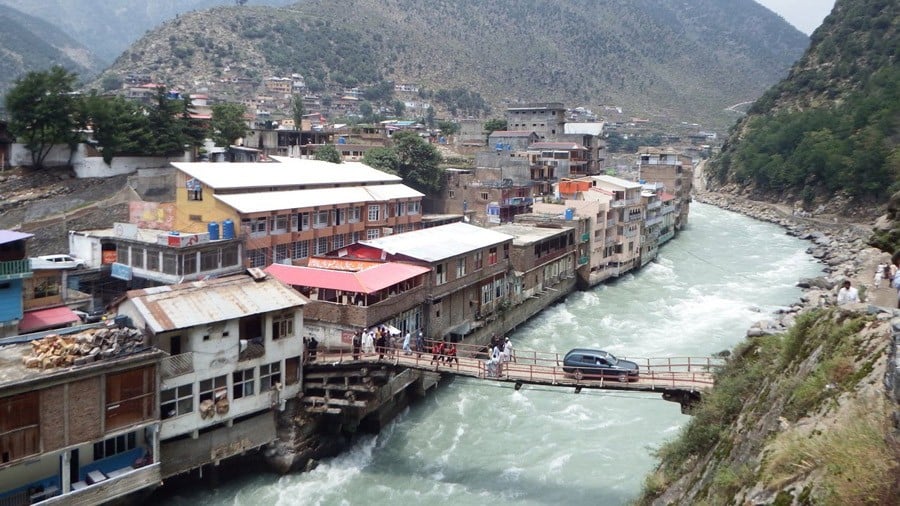
Post-militancy and post-flood Swat Valley is working to revive its local economy

Swat Valley has been a must-go place for local and foreign tourists. While the number of foreign tourists has come down, the number of local tourists is constantly on the rise after reaching record low due to security related issues.
A princely state that merged with Pakistan in 1969, it has seen different phases since then. On the one hand, it remained the hub of silk and cosmetics industry while on the other it became victim of militancy. Hotel industry and trout farming were major sectors generating employment for the local people.
It was in late 2000s that the valley went into the control of militants who played havoc with the lives of people and destroyed the economy of the region. Trout farms were destroyed and hotels occupied or damaged during this time. A military operation launched against militants in 2009 brought normalcy to the region and people who had left the region started returning gradually.
However, there was more for the valley to suffer from. In 2010, devastating floods caused huge damage to the infrastructure, hotels, agriculture and trout farms leading to loss of business and rise in unemployment. The flood waters swept away trout fish that was costly and had a high demand among tourists.
Following the military operation and flood, rehabilitation work was done in the valley to help people settle down and start earning decent livelihood but there is a perception that a lot more needs to be done to develop a robust local economy.
The situation at the moment is that a large number of people go to other cities to do labour and find jobs. There are those also who have gone to Gulf regions for work and send money. Due to lack of job opportunities in their vicinity, a significant number of people work as contract labour in coalmines situated in different parts of the country. Many of them die in coalmines but this does not deter others as they have to make a living anyway.
Muhammad Jameel, a local businessman, points out that it seems difficult that the silk and cosmetics industries can be revived. Those who fled during the militancy do not feel it viable to revive their abandoned units. He says the industry had flourished for the reason that the government had given a tax break here for an indefinite period but lately the tax officials had started imposing heavy taxes on products moving out of Malakand division. Their point is that the tax exemption is valid only if these products are sold within the territorial jurisdiction of the division.
Similar is the case with silk industry which Jameel says is no more viable. It had flourished due to availability of cheap raw material at Pak-Afghan border. The silk sent to Afghanistan under Pak-Afghan transit trade would be sold to silk cloth manufacturers in Swat. But now after the fencing of the border this is no more possible and the raw material if bought from other countries is too expensive. The closure of these two industries has rendered a number of people jobless.
Yousaf Ali, President Swat Chamber of Commerce and Industry (SCCI), tells TNS that maximum potential lies in tourism but for that proper infrastructure will have to be laid without delay. He says roads beyond Bahrain and to Kalam are in a dilapidated condition. The damage was done during floods of 2010 but unfortunately these roads have not been repaired. There is news that the road to Kalam will be in good shape by December this year.
Ali shares the number of foreign tourists has increased after the removal of No Objection Certificate (NOC) condition for them to enter Malakand division and simplifying of visa regime. "The option to get an e-visa of Pakistan will also serve as a booster," he hopes.
Ali does not pin hopes on revival of silk and cosmetics industries, terming these redundant. He says people came from as far as Karachi to set up cosmetics factories as there was tax exemption for investors. These people would manufacture goods here and take them down country for distribution/sale. After the takeover by militants, he says, investors got afraid and fled the area. "There were hundreds of cosmetic factories but now only 12 are functional," he adds.
The SCCI president adds that setting up of industrial zone can create employment opportunities as the valley has huge supplies of China clay and marble. Besides, he says, there is immense potential in fruits sector which can earn huge revenues if there are food processing units, enhanced road connectivity with major cities and cold supply chain availability. "This will increase shelf life of fruits like apricot, apple, cherry, aaloocha, etc, and minimise wastage."
While some economic sectors have faced irreversible damage leading to their extinction there are examples of revival as well. For example, the hotel industry and trout farms in Swat valley have made a comeback with good profits. However, the full potential of hotel industry will be tapped once the number of tourists rises.
Aftab Rana, who was consultant with USAID for a Swat rehabilitation project, tells TNS that under the project damaged hotels in Swat were given grants according to different categories they were divided in. Similarly, trout farmers were provided free fish seed as their stocks had been destroyed by militants or floods.
"Today, these sectors are doing well and are likely to grow at a fast pace," Rana says.